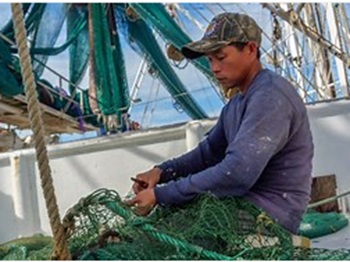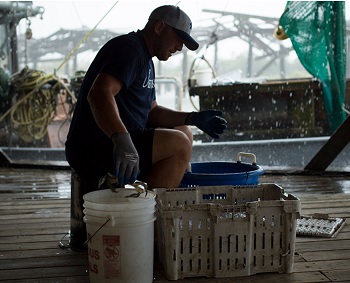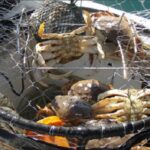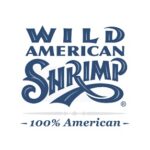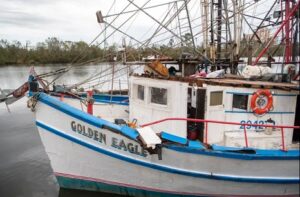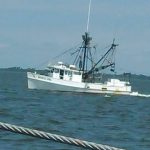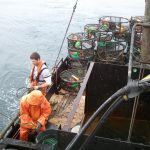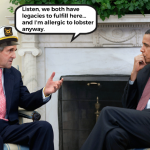Tag Archives: Southern Shrimp Alliance
South Carolina shrimpers are in troubled waters. Here’s how the industry is seeking relief
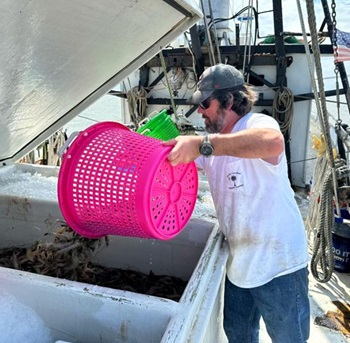 South Carolina shrimpers are in a fight for their industry’s future. Facing pressures from foreign countries shipping in cheap, frozen catches in abundance, domestic shrimpers have been unable to compete. Bryan Jones is a first-generation shrimper in McClellanville. Before his life became centered around nets and saltwater and fresh catch, he was a vice president of a wealth management firm in Florida. The work is exhausting and the days on the deck of his trawler, the Pamela Sue, are long, Jones said. There are risks involved with shrimping — financial, environmental, physical — but he saw an opportunity to create a livelihood for his family and couldn’t resist. He joins at a time when fishermen are struggling, and more are deciding to leave the trade altogether. “The average age of a shrimp boat captain, I believe, is 65,” Jones said. “What we need is an injection of youth in the industry to sustain it.” Photos, more, >>CLICK TO READ<< 11:21
South Carolina shrimpers are in a fight for their industry’s future. Facing pressures from foreign countries shipping in cheap, frozen catches in abundance, domestic shrimpers have been unable to compete. Bryan Jones is a first-generation shrimper in McClellanville. Before his life became centered around nets and saltwater and fresh catch, he was a vice president of a wealth management firm in Florida. The work is exhausting and the days on the deck of his trawler, the Pamela Sue, are long, Jones said. There are risks involved with shrimping — financial, environmental, physical — but he saw an opportunity to create a livelihood for his family and couldn’t resist. He joins at a time when fishermen are struggling, and more are deciding to leave the trade altogether. “The average age of a shrimp boat captain, I believe, is 65,” Jones said. “What we need is an injection of youth in the industry to sustain it.” Photos, more, >>CLICK TO READ<< 11:21
Is Your ‘Gulf’ Shrimp Actually Farm-Raised Overseas?
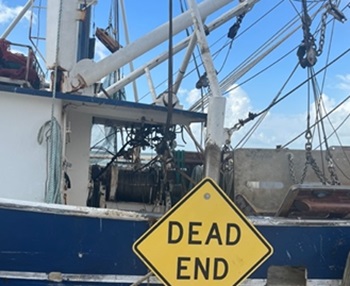 Think you love Gulf shrimp? It’s possible you’ve never even tasted it. Last Labor Day weekend, sample genetic testing at the Louisiana Shrimp & Petroleum Festival in Morgan City, Louisiana — where you’d naturally think “Gulf” shrimp was being sold and promoted in a town built on shrimping — revealed that only one of five vendors (Woodreaux’s Cajun Cuisine) was actually serving the real deal. Unaware festival goers never thought to question the source as they consumed imported, farm-raised shrimp right next to the Gulf of Mexico. Shrimp switching is likely happening at your favorite seafood eatery or grocery store, too, despite labeling and signage that may mislead you, just as it did those festival goers. Doug Olander, a commercial shrimp fisherman from Port St. Mary, Louisiana, whose boats have mostly remained docked for two years, says the supply chain needs the transparency that widespread testing provides. “This type of fraud should be a crime,” Olander says. more, >>CLICK TO READ<< 08:38
Think you love Gulf shrimp? It’s possible you’ve never even tasted it. Last Labor Day weekend, sample genetic testing at the Louisiana Shrimp & Petroleum Festival in Morgan City, Louisiana — where you’d naturally think “Gulf” shrimp was being sold and promoted in a town built on shrimping — revealed that only one of five vendors (Woodreaux’s Cajun Cuisine) was actually serving the real deal. Unaware festival goers never thought to question the source as they consumed imported, farm-raised shrimp right next to the Gulf of Mexico. Shrimp switching is likely happening at your favorite seafood eatery or grocery store, too, despite labeling and signage that may mislead you, just as it did those festival goers. Doug Olander, a commercial shrimp fisherman from Port St. Mary, Louisiana, whose boats have mostly remained docked for two years, says the supply chain needs the transparency that widespread testing provides. “This type of fraud should be a crime,” Olander says. more, >>CLICK TO READ<< 08:38
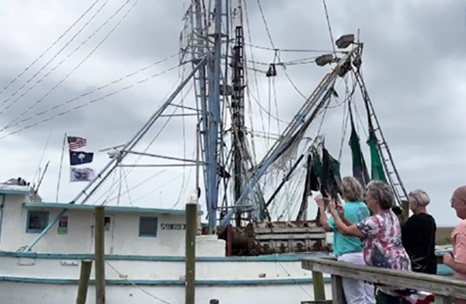
A call for the price of shrimp to rise as St. Helena Island’s boats head to sea
The future is uncertain for shrimpers in coastal South Carolina, but you wouldn’t know that from the bright, buoyant crowd that gathered Saturday at the Gay Fish Company. Attendees rang in the start of the 2024 season with cowbells and noisemakers, sending off a fleet of shrimp trawlers into the Harbour River as their nets waved like sails in the gentle morning breeze. Owned by a family of veterans spanning three generations, the Gay Fish Company on St. Helena Island held its inaugural “Blessing of the Fleet” Saturday morning. Typically involving a local pastor praying over captains for a safe and bountiful season, the practice has been a staple in fishing communities for centuries. But as fisheries up and down the coast grapple with industry shakeups from overseas, the ceremony takes on a new sort of significance. Photos, Video, more, >>CLICK TO READ<< 08:29
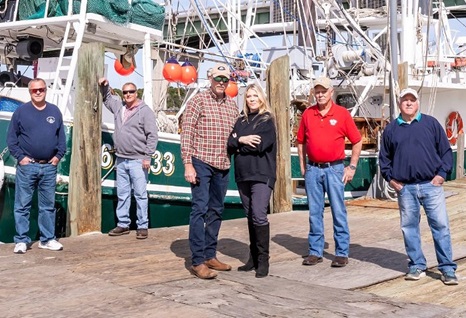
Coastal Georgia Shrimping: A new season of uncertainty, possibilities and hope
In a word, “difficult,” said Dee Kicklighter of their most recent shrimping season. Kicklighter, who has worked with Mathews for about eight years, has seen first-hand how the unpredictability of the business can be costly. “You plan for something to be one price, and then the next week you come back, and it could be potentially thousands of dollars more, depending on what you’re dealing with,” he said of fluctuating prices, including fuel. Over the years, Mathews said the ever-changing cost of fuel has taken a toll on the number of shrimpers in the industry. It’s not just Georgia shrimpers contending with the negative effects from imports. North Carolina, Texas, Louisiana, Florida and other coastal states are also feeling the friction of narrowing profit margins that threaten their way of life. Photos, more, >>click to read<< 09:15
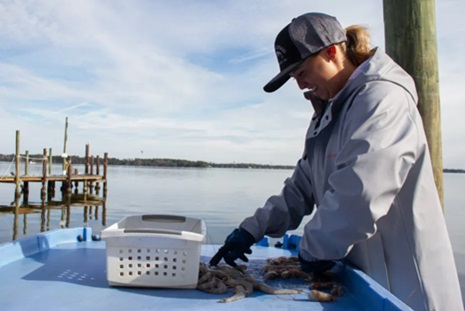
Shrimpin’ Ain’t Easy
Flicking heads off shrimp is one of the first jobs you learn when you’re born a Davis. Joseph “Jody” Davis remembers filling up a bucket of beheaded shrimp for his grandmother for a quarter when he was just 4 years old. “It wasn’t bad money in the ’70s,” he said, standing on the dock of Davis Seafood, the family business in Sneads Ferry. His 25-year-old daughter, Hannah, swiftly beheads a just-caught batch for a customer order. Muscle memory fills the bin. “We’ve been at this exact spot since 1949,” he said. “But we’ve been commercial fishermen for centuries.” The Davis Seafood office door is decorated with two stickers bearing the same mantra: “FRIENDS DON’T LET FRIENDS EAT IMPORTED SHRIMP.” Customers notice it and laugh. “But it’s more than just comedy,” Davis said. “It’s a way of life for us. And if people just cast us aside, we’re done.” photos, more, >>click to read<< 16:12
Southern Shrimp Alliance Submits Comments Opposing Request by Government of Vietnam to be Treated as a Market Economy
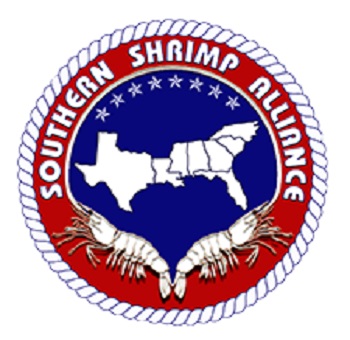 Over the objection of a large and diverse group of American industries and producers, the U.S. Department of Commerce (Commerce) is currently conducting an administrative proceeding to determine whether Vietnam should Government of Vietnam a market economy for the purposes of our antidumping duty laws. Commerce’s current practice treats Vietnam as a non-market economy (NME) and applies special rules to address the distortions caused by the government of Vietnam’s control over the country’s economy. Under these special rules, Vietnamese shrimp exporters that are controlled by the government are subject to a 25.76 percent antidumping duty rate. more, >>click to read<< 11:23
Over the objection of a large and diverse group of American industries and producers, the U.S. Department of Commerce (Commerce) is currently conducting an administrative proceeding to determine whether Vietnam should Government of Vietnam a market economy for the purposes of our antidumping duty laws. Commerce’s current practice treats Vietnam as a non-market economy (NME) and applies special rules to address the distortions caused by the government of Vietnam’s control over the country’s economy. Under these special rules, Vietnamese shrimp exporters that are controlled by the government are subject to a 25.76 percent antidumping duty rate. more, >>click to read<< 11:23
Southeast Texas shrimpers hope two new bills will help keep imported shrimp from taking away their jobs
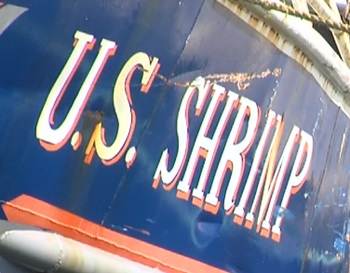 The Port Arthur Shrimper’s Association held an informational meeting Wednesday to help stop shrimp dumping. Shrimp dumping is the heavy importing of shrimp from other countries. Shrimpers in Southeast Texas are also pushing to impose stricter tariffs on imported shrimp. They say regulating the amount and quality of shrimp coming in could save their livelihoods. Two new federal bills could potentially benefit shrimpers and Southeast Texans. Local shrimpers say they aren’t making any money because U.S. businesses are buying imported shrimp at low prices. Video, more, >>click to read<< 09:47
The Port Arthur Shrimper’s Association held an informational meeting Wednesday to help stop shrimp dumping. Shrimp dumping is the heavy importing of shrimp from other countries. Shrimpers in Southeast Texas are also pushing to impose stricter tariffs on imported shrimp. They say regulating the amount and quality of shrimp coming in could save their livelihoods. Two new federal bills could potentially benefit shrimpers and Southeast Texans. Local shrimpers say they aren’t making any money because U.S. businesses are buying imported shrimp at low prices. Video, more, >>click to read<< 09:47
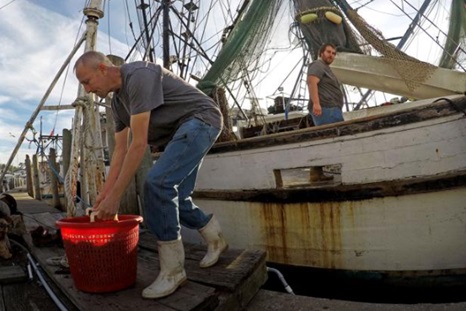
Last haul? As Georgetown eyes redevelopment, shrimpers brace for end of working waterfront
Timmy Jordan has spent most of his 49 years on the water. No wife. No kids. Just days and nights of dragging coastal waterway bottoms for shrimp, hoping for a good haul. But over the last few months, he has grappled with the stages of grief — denial, anger, bargaining and depression. He’s been preparing to moor his trawler alongside sailboats scattered in the Sampit River because he and this city’s other five shrimp boat owners were told the dock at the end of Cannon Street will close this month. The target date for the closure has been fluid since last year as the Tarbox family worked through selling Independent Seafood, the former wholesale market on the dock that originally opened in 1939. The shrimpers have tried to find open dock space from the North Carolina line toward Georgia but have been told no one has room. For them, an anchor is the only option. “This is my life ending,” Jordan said aboard his Miss Lue. “This is death for us that’s been in the business for so many years. We’re dying. It’s dying, and we’re dying with it.” 63 photos, more, >>click to read<< 11:55
‘A perfect storm’: Beaufort, Bluffton urge Gov. McMaster to take action on shrimp dumping
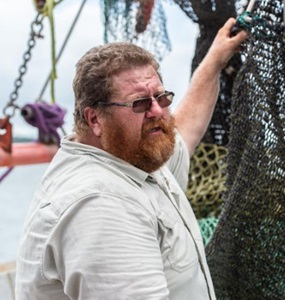 The city of Beaufort and the Town of Bluffton recently became the third and fourth coastal municipalities to call for the declaration of an economic disaster due to the dumping of imported shrimp into local markets. The actions speak to a statewide concern. Fishermen warn that limited resources and an inundated market have created a “perfect storm” that without intervention could tear apart South Carolina’s shrimping industry. On Dec. 12, Beaufort and Bluffton joined Mount Pleasant and McClellanville in urging Gov. Henry McMaster to declare an economic disaster due to the dumping of imported shrimp. Van Willis, Port Royal town manager, said officials there are planning to take a similar action in January. photos, more, >>click to read<< 06:29
The city of Beaufort and the Town of Bluffton recently became the third and fourth coastal municipalities to call for the declaration of an economic disaster due to the dumping of imported shrimp into local markets. The actions speak to a statewide concern. Fishermen warn that limited resources and an inundated market have created a “perfect storm” that without intervention could tear apart South Carolina’s shrimping industry. On Dec. 12, Beaufort and Bluffton joined Mount Pleasant and McClellanville in urging Gov. Henry McMaster to declare an economic disaster due to the dumping of imported shrimp. Van Willis, Port Royal town manager, said officials there are planning to take a similar action in January. photos, more, >>click to read<< 06:29
Beaufort leaders ask Gov. McMaster to declare economic disaster to help shrimping industry
 This all comes after local shrimper Craig Reaves sent this letter to city council explaining how shrimp dumping threatens his livelihood, and that of many others. In his letter to council, Reaves says that ‘all commercial fishing families have been decimated.’ He lists multiple reasons for said decimation but says that import dumping is the lead cause. For context, shrimp dumping is when farmed shrimp from other countries is sold to U.S. retailers and restaurants for below the market price that local shrimpers adhere to. Beaufort officials recognize the issue. “You can’t have locally owned operated seafood companies if the market price is going to be debased by this amount of flooded shrimp that’s coming in,” said Beaufort’s Acting Mayor Michael McFee. Video, more, >>click to read<< 08:40
This all comes after local shrimper Craig Reaves sent this letter to city council explaining how shrimp dumping threatens his livelihood, and that of many others. In his letter to council, Reaves says that ‘all commercial fishing families have been decimated.’ He lists multiple reasons for said decimation but says that import dumping is the lead cause. For context, shrimp dumping is when farmed shrimp from other countries is sold to U.S. retailers and restaurants for below the market price that local shrimpers adhere to. Beaufort officials recognize the issue. “You can’t have locally owned operated seafood companies if the market price is going to be debased by this amount of flooded shrimp that’s coming in,” said Beaufort’s Acting Mayor Michael McFee. Video, more, >>click to read<< 08:40
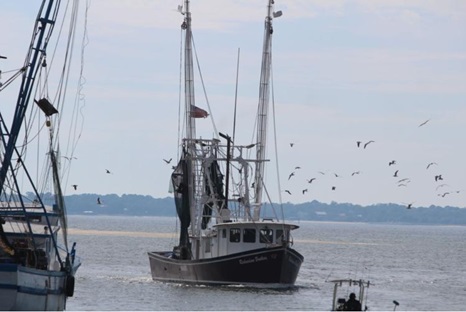
The Fleet fights back: Fishermen unite to curb shrimp dumping
Mount Pleasant’s Economic Development Committee met on Nov. 6 and voted in favor of the proposed economic disaster declaration from the South Carolina Shrimper’s Association and Southern Shrimp Alliance that asserts the Mount Pleasant shrimping fleet can’t sustain itself due to the harmful impacts of shrimp dumping, or the flooding of the market with imported, non-domestic shrimp. Mount Pleasant is the second municipality in South Carolina to declare a state of economic disaster for the domestic shrimping industry. Bryan Jones, vice president of the South Carolina Shrimper’s Association, said the declaration is more than symbolic — it’s one crucial part of a fight that is bringing fishermen from across the Southern United States together to defend their businesses, livelihoods and the shrimping industry as a whole. >>click to read<< 12:40
Louisiana elected officials seek to protect local fishermen from imported shrimp
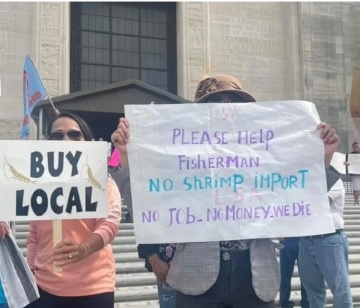 Louisiana elected officials are rallying to find solutions to help protect the state’s shrimp fishermen from cheap foreign shrimp that critics say is depriving shrimpers of their livelihood and undermining public health. Last month, the state Legislature’s Seafood Safety Task Force met to consider ways to stem the influx of shrimp from China and other nations amid concerns that the imported seafood may contain impurities that pose risks to the health of Louisianans. In addition, Gov. John Bel Edwards has requested that the U.S. secretary of commerce declare an emergency disaster declaration to provide assistance to shrimp fishermen. The Florida-based Southern Shrimp Alliance is also urging governors of Gulf and southeastern states to request federal relief funds for shrimpers. >>click to read<< 07:29
Louisiana elected officials are rallying to find solutions to help protect the state’s shrimp fishermen from cheap foreign shrimp that critics say is depriving shrimpers of their livelihood and undermining public health. Last month, the state Legislature’s Seafood Safety Task Force met to consider ways to stem the influx of shrimp from China and other nations amid concerns that the imported seafood may contain impurities that pose risks to the health of Louisianans. In addition, Gov. John Bel Edwards has requested that the U.S. secretary of commerce declare an emergency disaster declaration to provide assistance to shrimp fishermen. The Florida-based Southern Shrimp Alliance is also urging governors of Gulf and southeastern states to request federal relief funds for shrimpers. >>click to read<< 07:29
Beaufort’s shrimping industry on the brink. Local boats sit while imported catch floods market
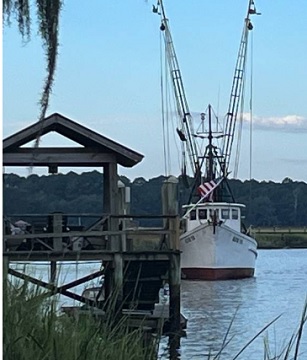 Thursday at Village Creek on St. Helena Island was another picture postcard-worthy morning with an American flag lilting in a slight southeast breeze near the shrimper Gracie Bell — idly tied to the dock. At Sea Eagle Market, a catch of shrimp swept up in the nets of trawlers in recent days are being processed by small group of dockside workers. They clean the valuable seafood crop harvested from waters as far away as North Carolina to the northeast coast of Florida before being sold locally and up and down the Palmetto State’s coast. After this recent harvest was completed, the boats returned, as they always do — to Village Creek, home base for shrimping on Fripp and Hunting Islands in Beaufort County and beyond. Against this serene backdrop, a storm is brewing that threatens destruction. It is not the threat of foul weather, these shrimpers have seen generations of bad weather days. The storm brewing is economic for the community of shrimpers and related businesses. >click to read< 10:10
Thursday at Village Creek on St. Helena Island was another picture postcard-worthy morning with an American flag lilting in a slight southeast breeze near the shrimper Gracie Bell — idly tied to the dock. At Sea Eagle Market, a catch of shrimp swept up in the nets of trawlers in recent days are being processed by small group of dockside workers. They clean the valuable seafood crop harvested from waters as far away as North Carolina to the northeast coast of Florida before being sold locally and up and down the Palmetto State’s coast. After this recent harvest was completed, the boats returned, as they always do — to Village Creek, home base for shrimping on Fripp and Hunting Islands in Beaufort County and beyond. Against this serene backdrop, a storm is brewing that threatens destruction. It is not the threat of foul weather, these shrimpers have seen generations of bad weather days. The storm brewing is economic for the community of shrimpers and related businesses. >click to read< 10:10
North Carolina: State’s shrimping industry needs Cooper’s support
 As the state’s shrimping industry faces a perfect storm of challenges that may result in the demise of hundreds of family owned fishing businesses, it is time for Governor Cooper to show that he is as committed to the small entrepreneur as he is the large industrial investors that he continually promotes whenever a ribbon cutting opportunity arises. John Williams, executive director of the Southern Shrimp Alliance has sent a letter to eight coastal governors, including North Carolina’s, asking their support both financially and politically as the domestic shrimping industry faces unprecedented challenges to its existence. So far the alliance has not received a positive response. Describing the situation as “an unprecedented catastrophic crisis that threatens its (the domestic shrimping industry’s) very existence,” William’s letter notes that foreign imports along with high fuel prices are devastating “the many family-owned businesses that are the core of the economies of coastal communities.” >>click to read<< 08:36
As the state’s shrimping industry faces a perfect storm of challenges that may result in the demise of hundreds of family owned fishing businesses, it is time for Governor Cooper to show that he is as committed to the small entrepreneur as he is the large industrial investors that he continually promotes whenever a ribbon cutting opportunity arises. John Williams, executive director of the Southern Shrimp Alliance has sent a letter to eight coastal governors, including North Carolina’s, asking their support both financially and politically as the domestic shrimping industry faces unprecedented challenges to its existence. So far the alliance has not received a positive response. Describing the situation as “an unprecedented catastrophic crisis that threatens its (the domestic shrimping industry’s) very existence,” William’s letter notes that foreign imports along with high fuel prices are devastating “the many family-owned businesses that are the core of the economies of coastal communities.” >>click to read<< 08:36
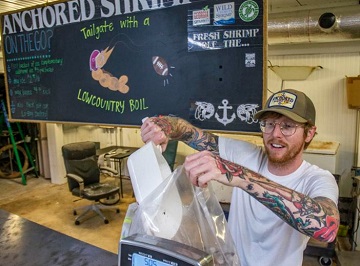
Shrimp Alliance request fisheries disaster declaration
There’s no other way to put it if you ask Aaron Wallace. Despite a decent catch by the eight shrimp boats that supply Anchored Shrimp Co. in Brunswick, the prices fishermen are getting for their hauls aren’t what they should be. “It’s been one of our toughest years,” Wallace said. He and his father, John Wallace, own Anchored Shrimp and operate the Gale Force, one of the boats that serve the company’s retail and wholesale business. The Southern Shrimp Alliance, for which John Wallace serves as a member of the board of directors, is calling the flood of imported shrimp a crisis. The alliance asked the governors of Alabama, Florida, Georgia, Louisiana, Mississippi, North Carolina, South Carolina and Texas in a letter on Aug. 25 to collectively request a fisheries disaster determination by the U.S. Secretary of Commerce for the U.S. shrimp fishery. >>click to read<< 11:06
Imported shrimp eaten in U.S. may not be safe – U.S. Rep. Castor wants to do something about it
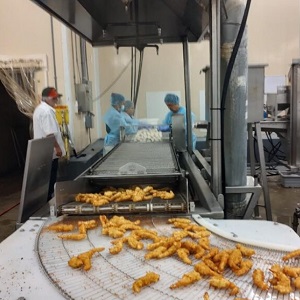 With inventories of shrimp sitting at docks throughout the Gulf Coast due to an abundance of imported seafood, the shrimp industry and U.S. Rep. Kathy Castor of Florida want to increase the purchase of domestic shrimp in the United States and provide more federal funding to regulate imported shrimp for consumers. John Williams is the executive director of the Southern Shrimp Alliance, which represents members of the shrimp industry from Texas through North Carolina. He said a lot of his members that are suffering right now. Castor’s bill, the Laws Ensuring Safe Shrimp Act (LESS Act) would address that issue by vastly increasing funding for the FDA to do inspections of foreign produced shrimp. >click to read< 16:07
With inventories of shrimp sitting at docks throughout the Gulf Coast due to an abundance of imported seafood, the shrimp industry and U.S. Rep. Kathy Castor of Florida want to increase the purchase of domestic shrimp in the United States and provide more federal funding to regulate imported shrimp for consumers. John Williams is the executive director of the Southern Shrimp Alliance, which represents members of the shrimp industry from Texas through North Carolina. He said a lot of his members that are suffering right now. Castor’s bill, the Laws Ensuring Safe Shrimp Act (LESS Act) would address that issue by vastly increasing funding for the FDA to do inspections of foreign produced shrimp. >click to read< 16:07
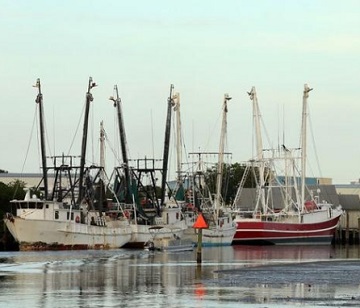
Data shows Florida seafood landings rank below historic trends, Hurricane losses, high diesel prices likely to blame
Since the COVID-19 pandemic, hurricanes and increased fuel costs have reduced the catch of Florida’s seafood industry. Florida’s Gulf Coast is the largest fishery for the state and is still dealing with the effects of Hurricane Ian in late 2022. The storm made landfall at Fort Myers and devastated Florida’s shrimping industry, sinking boats and destroying infrastructure crucial to the industry. According to preliminary data compiled by The Southern Shrimp Alliance from the National Oceanic and Atmospheric Administration’s Fishery Monitoring Branch, Florida’s March 2023 landings off the West Coast were 72.7% below the historical average. In total, 2023 landings for the West Coast are 42.1% below historical trends. >click to read< 10:06
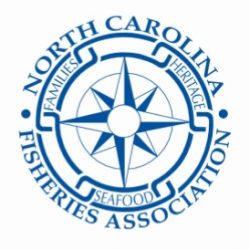
North Carolina Fisheries Association Weekly Update for January 31, 2023
Snapper Grouper Discard Mortality Reduction & Private Rec. Permitting (Amendments 35 & 46)/REMINDER: Southern Shrimp Alliance Needs Your Help/Legislative Update. The last year or so the South Atlantic Fisheries Management Council (SAFMC) has been working on multiple Snapper Grouper Amendments. Amendments 35 and 46 were voted on and approved for scoping and public comment at the December SAFMC meeting. Informational webinars with opportunities to provide public comment for both amendments are scheduled soon (Amendment 46 webinar is scheduled for January 30th and February 6th at 6pm and Amendment 35 webinar is scheduled for January 31st at 6pm). Links >click to read< 12:04

North Carolina Fisheries Association Membership, Southern Shrimp Alliance Needs Your Help!
As indicated below, the U.S. International Trade Commission has now issued questionnaires in its sunset review proceeding to the U.S. shrimp industry, U.S. shrimp importers, U.S. shrimp purchasers, and exporters and processors in the Chinese, Indian, Thai, and Vietnamese shrimp industries. The responses to these questionnaires, which are due on or before February 6, 2023, will provide the basis for the Commission’s analysis as to whether to keep the antidumping duty orders on Chinese, Indian, Thai, and Vietnamese shrimp in place for another five years. Thank you, in advance, for your assistance in meeting the U.S. International Trade Commission’s request for information. >Click to read, and access links< 13:11

Hurricane Ian remains lingering threat to SWFL’s commercial fishing industry
Florida’s Gulf Coast has experienced many hurricanes, but Ian wasn’t like anything local commercial fishermen had seen before. “I don’t think any of these storms in other places have wiped out all the infrastructure as they did for us,” Streeter says. “In Lee County, we definitely lost three of the deep-water working waterfronts, and on the island, we lost three out of the four fish houses that were executing fisheries. So, we took a major hit. It’s going to be really difficult to get these fisheries back online as they were until we get that infrastructure, until we get docks in and until we get refrigeration.” “We’re in a hard spot right now and we definitely need some help from our governor. We definitely need some congressional federal help for our fisheries.” photos, >click to read< 08:38
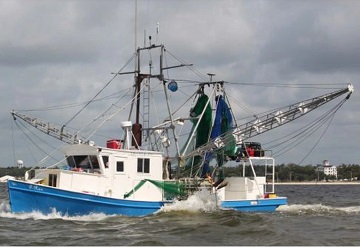
USDA to buy $25 million in shrimp
The United States Department of Agriculture is purchasing $25 million in shrimp caught in the Gulf of Mexico and South Atlantic. The purchase will provide relief to Louisiana’s shrimp industry, according to Congressman Garret Graves’ office. The USDA will use the shrimp for food nutrition assistance programs, according to Congressman Clay Higgins’ office. The USDA made similar purchases of shrimp in 2020 and 2021. >click to read< Southern Shrimp Alliance Applauds Announcement of $25 Million in Additional USDA Section 32 Purchases of Shrimp – >click to read< 15:18
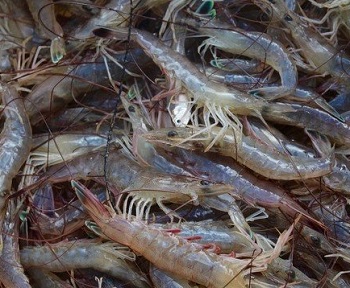
Fernandina’s Shrimping Industry: Storied Past, Uncertain Future – A Look Back
Here we are in the birthplace of American shrimping industry. We greet visitors with a waterfront Shrimping Museum. Pink and blue larger-than-life statues of shrimp adorn our parks and street corners. Our major civic celebration is the annual Shrimp Fest, complete with a parade and people dressed like crustaceans. But is it all just nostalgia? Is our historic shrimping industry just a museum piece, or is it a vibrant business that will survive and thrive? At Dave Cook’s dock at the south end of Front Street, Roy Mc Henry, who was working on his 39-foot shrimper, Queen B, while his aging Golden Retriever, Sweetie, lounged in the cockpit. Capt. McKendree was not optimistic about the state of the local shrimp industry. >click to read< 09:22
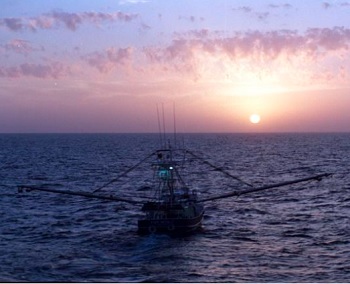
Anglers welcome offshore wind energy in the Gulf of Mexico; shrimpers skeptical
While commercial shrimpers worried that turbines might crowd them out of prime harvesting areas, recreational fishing groups wanted assurances they could get as close as possible to turbines, which can act as artificial reefs. Off the coast of New England, commercial fishers are fighting plans for large offshore wind farms. They say the farms will overlap some of the best spots to catch squid, lobster and other species, and could make fishing more dangerous and costly. >click to read< 07:43

Mississippi: Shrimp industry leader Richard Gollott has passed away
Richard Gollott, a longtime commissioner with the Commission on Marine Resources and seafood industry leader, died Sunday after a long battle with cancer. He was 77. Gollott opened Cap’n Gollott Seafood in 1969, which grew to be one of the largest oyster processing companies on the Gulf Coast. He served as president of Gollott’s Oil Dock & Ice House, Inc., and vice president of Golden Gulf Coast Pkg Co., Inc, working alongside his son and brother as partners. Gollott was a lifelong resident of the Coast and a founding member of the Southern Shrimp Alliance. He also was a board member of the American Shrimp Processors Association. >click to read< 14:21
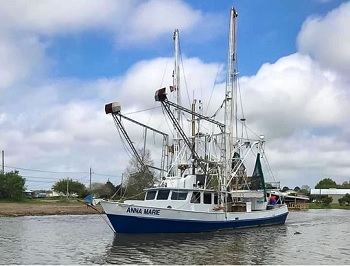
‘Another punch in the gut’: Gulf Coast shrimpers navigate the coronavirus crisis
Shrimping is a hard business. Gulf Coast shrimpers, who bring in three quarters of the nation’s catch, have been battered with waves of bad luck. Hurricanes. A flood of cheap imports. The BP Deepwater Horizon oil spill in 2010. Fresh water diversions that kill seafood. And now the coronavirus. Restaurants buy 80% of both imported and domestic shrimp, according to the Southern Shrimp Alliance. With restaurants closed or offering only takeout, no one is buying much shrimp. Next month would typically launch the peak of shrimp season as Gulf states begin their annual opening of nearshore waters to shrimping. >click to read< 07:45
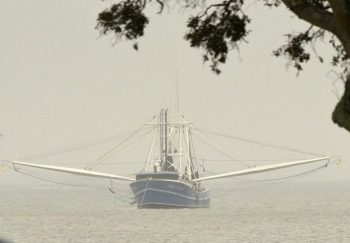
Illegal foreign fishing draws congressional eye
Nathan Rickard, representing local shrimpers through the Southern Shrimp Alliance, was one of the people invited to speak on a panel to the subcommittee. He said federal anti-dumping laws helped provide stability to an industry that received a massive hit from imported shrimp beginning in the late ‘90s. “Although the industry permanently had lost many shrimping families, and has struggled to maintain its foothold in some coastal communities, the threat that the industry would entirely disappear has abated,” Rickard said. “The U.S. shrimp industry currently produced about one out of every eight pounds of shrimp that are consumed in our country. >click to read< 10:10
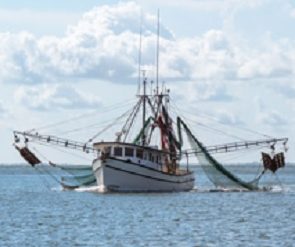
Fishery Disaster Assistance Soon to Be Available to Georgia Shrimpers
The Southern Shrimp Alliance is pleased to inform the Georgia shrimp industry that $1.062m in financial assistance has been made available to address the 2013 Georgia shrimp fishery disaster. Commerce Secretary Wilbur Ross announced the funding in a March 27, 2019 press release. In a February 10, 2014, letter to then U.S. Secretary of Commerce Penny Pritzker, then Georgia Governor Nathan Deal filed a request for fishery disaster assistance pursuant to section 312(a) of the Magnuson-Stevens Fishery Conservation and Management Act (MSA). >click to read<17:07
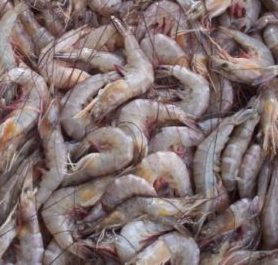
Gulf Council Votes to Relax Quotas on Shrimp Fishing
Today, the Gulf of Mexico Fishery Management Council took final action on shrimp Amendment 18, allowing shrimpers to increase the amount of fishing allowed under the red snapper rebuilding plan. The Southern Shrimp Alliance advocated for this change for more than two years. The Council was unanimous in its decision. Once again, the Alliance won its arguments before regulators by presenting scientific research. The Council’s actions acknowledge that the shrimp fishery has made a substantial contribution to the rebuilding of the red snapper stock. Since the plan went into effect, shrimpers have achieved 100% compliance with the red snapper management plan’s goals. >click to read<17:28






